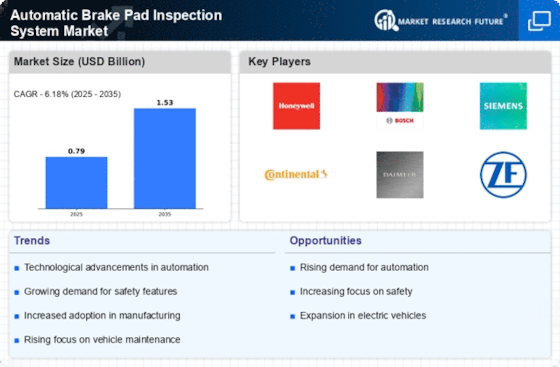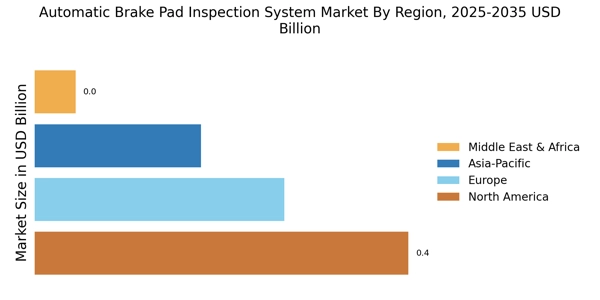Safety Regulations
The Automatic Brake Pad Inspection System Market is significantly influenced by stringent safety regulations imposed by various authorities. These regulations mandate regular inspections and maintenance of braking systems to ensure vehicle safety. As a result, automotive manufacturers and service providers are increasingly adopting automated inspection systems to comply with these regulations. The market data indicates that regions with stricter enforcement of safety standards are witnessing a higher adoption rate of these systems. This compliance not only enhances safety but also reduces liability for manufacturers and service providers, thereby propelling the growth of the Automatic Brake Pad Inspection System Market.
Rising Vehicle Production
The Automatic Brake Pad Inspection System Market is poised for growth due to the rising production of vehicles across various segments. As automotive manufacturers ramp up production to meet consumer demand, the need for efficient quality control measures becomes paramount. Automated brake pad inspection systems offer a solution to ensure that each vehicle meets safety and performance standards before reaching the consumer. Recent statistics indicate that vehicle production is on an upward trajectory, which correlates with an increased demand for inspection systems. This trend suggests that manufacturers are likely to invest in advanced inspection technologies to maintain quality assurance, thereby driving the Automatic Brake Pad Inspection System Market.
Technological Integration
The Automatic Brake Pad Inspection System Market is experiencing a surge in technological integration, particularly with the advent of advanced sensors and machine learning algorithms. These innovations enable real-time monitoring and analysis of brake pad conditions, enhancing safety and performance. As vehicles become increasingly equipped with smart technologies, the demand for automated inspection systems is likely to rise. According to recent data, the market for automotive sensors is projected to grow significantly, indicating a parallel increase in the need for sophisticated inspection systems. This trend suggests that manufacturers are prioritizing the development of integrated solutions that not only improve efficiency but also reduce maintenance costs, thereby driving the Automatic Brake Pad Inspection System Market.
Increased Focus on Preventive Maintenance
The Automatic Brake Pad Inspection System Market is benefiting from an increased focus on preventive maintenance among vehicle owners and fleet operators. This shift in mindset emphasizes the importance of regular inspections to prevent costly repairs and enhance vehicle longevity. As awareness of the benefits of preventive maintenance grows, the demand for automated inspection systems is likely to rise. Market data suggests that businesses are increasingly adopting these systems to streamline their maintenance processes and reduce downtime. This trend indicates a potential for significant growth in the Automatic Brake Pad Inspection System Market as more stakeholders recognize the value of proactive maintenance strategies.
Consumer Demand for Enhanced Vehicle Performance
The Automatic Brake Pad Inspection System Market is driven by consumer demand for enhanced vehicle performance and safety features. As consumers become more discerning about the quality and reliability of their vehicles, manufacturers are compelled to adopt advanced inspection technologies. The integration of automated brake pad inspection systems not only ensures optimal performance but also enhances the overall driving experience. Market analysis reveals that consumers are willing to invest in vehicles equipped with cutting-edge safety features, which includes automated inspection systems. This consumer trend suggests a robust growth potential for the Automatic Brake Pad Inspection System Market as manufacturers strive to meet evolving consumer expectations.

















